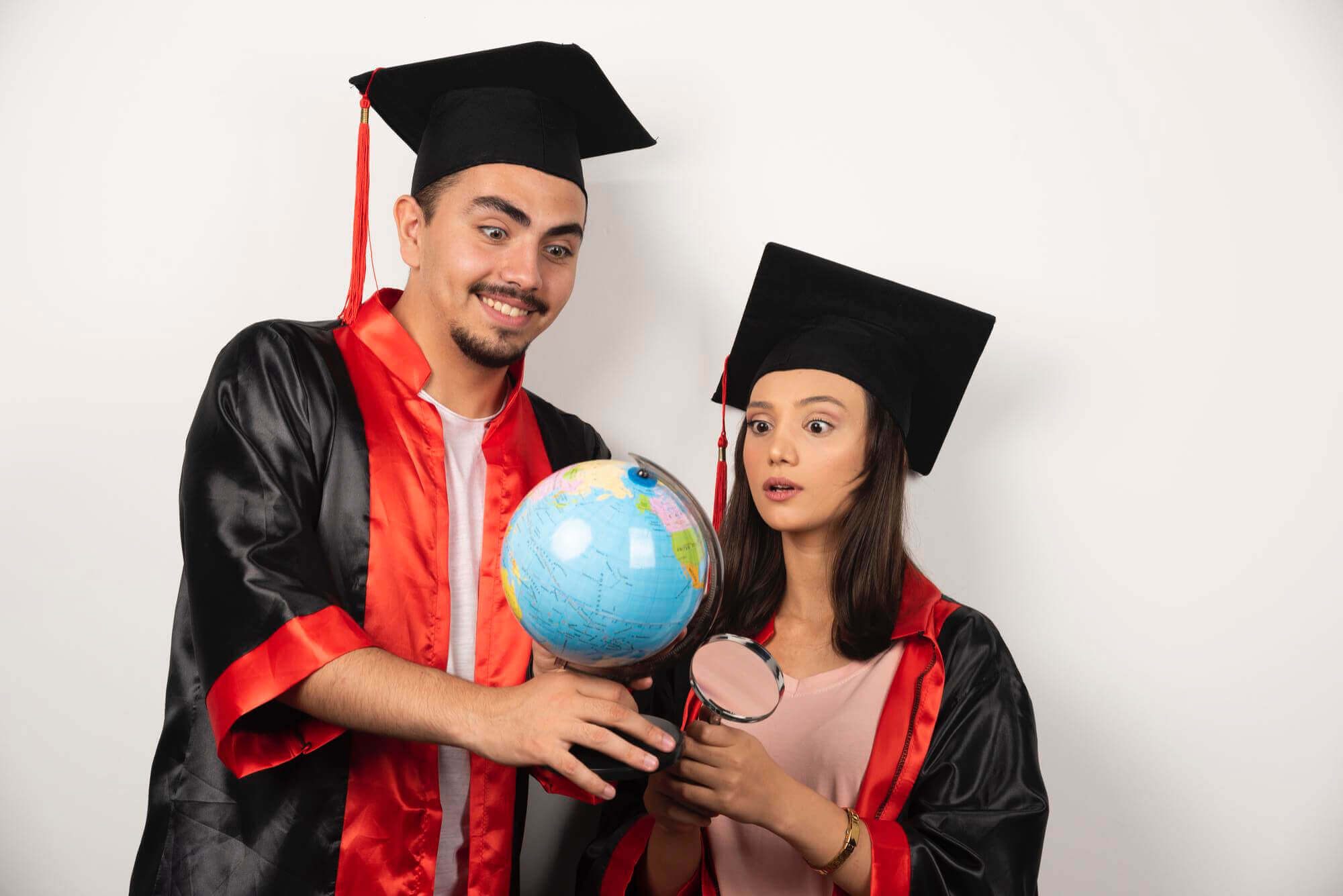Venturing into postgraduate studies abroad after an undergraduate degree in India is a transformative journey filled with opportunities and challenges. The Indian Student Mobility Report 2023 reveals that a staggering 1.3 million Indian students are pursuing higher education overseas, with approximately 60 percent enrolled in postgraduate studies. Projections suggest this number will rise to 1.5 to 2 million by 2025, reflecting the increasing globalisation of education and the growing inclination towards advanced studies beyond borders.
Based on ICEF Monitor, a market intelligence source for the international education industry, Indian enrolment remains highly concentrated in the US, UK, Canada, and Australia. Given the requirement of four-year undergraduate degrees in countries such as the US and Canada, transitioning from a three-year undergraduate to postgraduate studies can be challenging. In this blog, we will offer insights to assist you in pursuing post-graduation abroad after completing a three-year degree in India.
The undergraduate education system in India
The duration of undergraduate education in India varies depending on the field of study. While professional degrees like engineering and medicine typically take four to five years, many liberal arts and business programmes are three years long, adding up to 15 years (12+3) of education.
Some National Assessment and Accreditation Council (NAAC)–accredited institutions, like Ashoka University and Shiv Nadar University, offer the option of continuing education for four years. These programmes allow students to align their degree with the four-year undergraduate requirement internationally. According to the National Education Policy (NEP), these programmes offer students a flexible pathway to complete their bachelor’s degree in three years or pursue a four-year honours degree, enabling more advanced research and interdisciplinary study.
Exploring postgraduate options abroad after a three-year bachelor’s degree
Suppose you have completed a three-year undergraduate degree in India and plan to pursue a postgraduate degree abroad. In that case, it is vital to research the specific requirements of the courses in the countries to which you wish to apply. Let’s explore the options:
1) The UK:
Most universities in the UK accept three-year bachelor’s degrees from India as a prerequisite for admission to various master’s degree programmes. For instance, to be eligible for master’s programmes like MA, MSc, MRes, or MBA at University College London, you must have completed a three to five-year Bachelor’s degree with a first class from a government-recognised institution in India. Similarly, you can apply for admission to the MSc in Strategic Marketing programme at Imperial College London if you hold a three to four-year bachelor’s degree from a recognised Indian institution with the required grades.
2) Australia:
Australian universities welcome applicants with a three-year Indian bachelor’s degree to enrol in master’s programmes. For instance, if you intend to pursue a Master of Ecosystem Management and Conservation at the University of Melbourne, you must have completed a three-year undergraduate degree in a closely related field with a minimum mark of 65 percent or equivalent.
3) New Zealand:
In New Zealand, several universities acknowledge three-year bachelor’s degrees from India. For example, The University of Auckland offers a Master of Artificial Intelligence (MAI) programme requiring a Bachelor of Science with a Grade Point Average of 4.0 or equivalent to be eligible for admission.
4) Europe:
European universities are flexible when accepting three-year Indian undergraduate degrees for postgraduate studies. In Germany, institutions like Humboldt University, Berlin, Heidelberg University, and Ludwig Maximilian University welcome three-year degree holders from India for enrollment in various master’s degrees across disciplines. Additionally, European universities extending their presence to the UAE offer new avenues for postgraduate education. For instance, the University of Europe for Applied Sciences, Germany, offers a Master’s in Data Science in Dubai, welcoming applicants with Indian three-year bachelor’s degrees.
Furthermore, France is open to accepting three-year Indian degrees for postgraduate studies. For instance, a Master’s in Finance at the Essec Business School requires a three-year undergraduate degree.
5) Singapore:
Singapore is an excellent option for pursuing a master’s degree without going too far from home. Specific courses, such as the Master of Arts in Instructional Design and Technology at Nanyang Technological University, accept Indian three-year degrees.
6) US:
The majority of postgraduate programmes in US universities require a four-year undergraduate degree as a prerequisite. For instance, if you hold a three-year undergraduate degree from India, you might not qualify for graduate study in many programmes at Stanford University. Similarly, San Jose State University does not consider three-year bachelor’s degrees from India.
However, institutions such as Columbia University, Northwestern University, the University of Pennsylvania and the University of Chicago consider applicants with three-year degrees from foreign institutions on a case-by-case basis. Similarly, a three-year undergraduate degree fulfils the prerequisite for graduate admissions at Yale University.
Massachusetts Institute of Technology (MIT) generally accepts applicants with three-year degrees, although specific departments may have additional requirements. For instance, MIT’s Master’s in Data, Economics, and Design of Policy (DEDP) mandates completing the online MITx MicroMasters credential as part of its unique admissions process, with no GRE or GMAT tests required.
7) Canada:
In Canada, some universities have specific requirements for accepting three-year undergraduate degrees from India. For instance, the University of British Columbia accepts a three-year degree from India for postgraduate admission if you have achieved a first-class degree from an institution either accredited by India’s National Assessment and Accreditation Council (NAAC) with a grade of A or better or a university designated as an Institution of National Importance, such as the Indian Institute of Technology.
Similarly, some programmes at York University in Canada may accept applicants with a three-year undergraduate degree, especially if they have relevant work experience. However, you may need to fulfil additional requirements if you currently reside in Canada and seek admission to a graduate programme with a three-year degree from India. This includes completing one full year of undergraduate coursework at the 3000 and 4000 levels.
Strategies for Meeting Four-Year Bachelor’s Degree Requirements for Master’s Programmes
Proactively addressing the US and Canada’s 16-years of education criteriacan improve your chances of securing admission. Here are several ways to meet this requirement:
1) Communicate with the university:
Contact the university’s admissions office to address your concerns and explore potential solutions for the 16-year education requirement. Ensure that your undergraduate degree aligns with the master’s you want to pursue.
2) Transfer during undergraduate studies:
Consider transferring to a university in the US or Canada during your undergraduate studies. According to the United States – India Educational Foundation (USIEF), it’s possible to transfer from an Indian university to a US university without losing academic credits or starting over. US universities have flexible credit systems, allowing coursework completed at one institution to be recognised by another if you meet specific criteria. Over a million students, including those from non-US institutions, transfer to US universities each year.
3) Pursue a postgraduate degree in your country:
Pursue a postgraduate degree in your home country before applying for a Master’s abroad to fulfil the educational criteria certain universities require. You may apply for credit transfer or course waivers from your postgraduate work. For example, approved international coursework is considered for transfer credits at Purdue University, subject to varying limits and minimum grade requirements. Transfer credit processing occurs alongside Plan of Study (POS) approval.
4) Enrol in a postgraduate diploma or a certificate course:
A postgraduate diploma or certification can complement your three-year undergraduate degree. Universities such as Cornell accept a three-year undergraduate degree with a postgraduate diploma for admission to its master’s programme. Many universities in the US offer graduate certificate programmes. For instance, Northwestern University provides over 41 certificates in education, project management, leadership, and technology, which can serve as a springboard for your master’s degree. In many cases, graduate coursework completed as part of a certificate programme may be applied toward a graduate degree. Admission to these certificate programmes is typically less competitive than for master’s programmes.
Many accredited universities in India offer one-year diploma programmes to students who have completed an undergraduate degree. For example, suppose you complete a Diploma in Business Analytics from Ahmedabad University after finishing a three-year undergraduate programme. In that case, you will be granted a fourth year at the university, making you eligible to apply to various postgraduate programmes abroad.
5) Highlight your Work Experience:
Certain university courses accept applications from students with three-year bachelor’s degrees if they provide proof of relevant work experience. For example, the Schulich School of Business at York University may consider such applicants for admission if they have at least one year of additional work experience beyond the minimum requirement.
6) Enrol in a bridge programme:
You can opt for a bridge programme designed for international students. Many universities in the US offer bridge programmes, which include two semesters of advanced graduate preparation for students with select three-year international undergraduate degrees. For instance, the INTO Mason bridge programme at George Mason University allows you to start taking classes in their master’s programme while fulfilling the general education requirements needed for graduate school.
7) Consider academic credential evaluation:
Evaluating your academic credentials to ensure eligibility for university admission abroad is advisable, especially if you hold a three-year undergraduate degree from India. Several reputable third-party organisations, such as WES (World Education Services), ECE (Educational Credential Evaluators), and ERES (Educational Records Evaluation Service), offer credential evaluation services. This evaluation determines equivalency and validates your qualifications.
WES (World Education Services) is recognised as a National Association of Credential Evaluation Services (NACES) member and is North America’s largest nonprofit credential evaluation service. WES undertakes the verification of your educational documents directly with the issuing institutions, a process that ensures the accuracy of the evaluation. Renowned as the Gold Standard for Credential Evaluations, WES evaluates academic credentials from over 48,000 institutions across 203 countries. They offer various tools, including the WES Degree Equivalency Tool, which allows you to determine the equivalency of your degree in the US and Canada and convert GPAs as required.
Typically, WES completes evaluations within seven business days of receiving and approving all necessary documents. They utilise a secure online delivery system to send evaluation reports to accredited academic institutions. It is advisable to initiate the credentials evaluation process during their final year of undergraduate studies by creating an account and submitting an application. The WES website answers frequently asked questions about Indian degrees and credential evaluations and offers comprehensive support throughout the evaluation process.
While global universities increasingly accept three-year bachelor’s degrees, it’s crucial to diligently research each institution’s policies and requirements before applying for master’s programmes to ensure a smooth admission process. At The Red Pen, we provide extensive support to postgraduate applicants at every stage of the application process. Please contact us if you need assistance with your application; our postgraduate admissions specialists look forward to helping you. In the meantime, you can read our blogs 5 Mistakes You Need to Avoid in Postgraduate Applications and Top 5 Highest-Paid Master’s Degrees in the World




